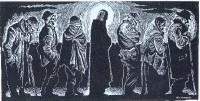

Karen House Catholic Worker
 |
Karen House Catholic Worker |
The RoundTable Catholic Social Teaching: 100 Years Fall 1991 Major Articles
|
Download Entire Issue by Clicking Image Above (large file - takes a minute!) |
|||
Karen House: 1840 Hogan St. Saint Louis, MO 63106 Contact Us: 314.621.4052 |
Regular Features
|
Why This Issue: In 1932, George Shuster, the editor of Commonweal magazine, sent Peter Maurin to visit Dorothy Day. He instructed Peter to search her out because, in Dorothy's words, "George thought that we were alike in point of view, both interested in changing the social order and in reaching the masses with the social teachings of the Church." Nearly sixty years after that December day, the Catholic Worker is still trying to live by the counsels of the Gospels and reach others in the spirit of the Church's social teachings. This issue of the Round Table is a look at Catholic Social Teaching and what it has to say about our lives and our world.
Mark Neilsen gives a bird's-eye view of Catholic Social Teaching and how it applies to key issues today. He encourages us to see that these writings are less a blueprint for a social system and more a challenge to live a creative and committed life within the Church and society. Amata Miller provides insightful reflections on how these teachings evolved over the years: as the awareness of poverty has grown, official teaching of the Church has increasingly sided with the poor and powerless. Pat McCormick also writes about the evolutionary nature of the social teachings, and points out that dialogue within the Church on important matters needs not only to include women but also must allow the poor to be addressed as conversational partners and subjects of their own lives and history. In three interviews we briefly look at these writings in light of the experience of women, the environmental crisis, and in the context of working men and women in the U.S. The centerfold illustrates the chronological development of these writings and some main themes they touch upon.
In the regular columns, Sharon Cummins reflects on being a mother at Karen House; Mary Ann McGivern weaves a story of God's faithfulness to us over the long haul; and Rosemary Davison describes the plight of the poor in Panama -a terrible reality that makes one wonder just what went wrong in the (U.S.-engineered) shift from despotism to "democracy"....
As I worked on this issue, I couldn't help but wonder why Catholic Social Teaching is not, in Peter Maurin's words, "the dominant social dynamic force" in our Church and world? Is it the language or length of the writings, or their lack of a local focus? A friend of mine suggested that most people just don't know what these teachings are; many don't even know that they exist Perhaps this issue can help us begin to explore these writings and discover their usefulness for our lives and our world.
-Bill Miller
|
The RoundTable is 24 pages long. To download, you'll need the most recent version of Adobe Acrobat. Download Adobe Acrobat 8 here (it's easy AND free!)
Search all of the RoundTable issues for an author, subject or title here: |